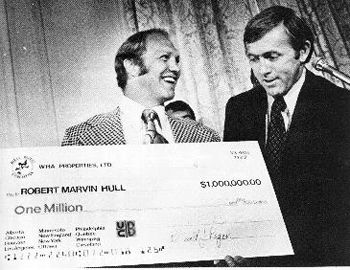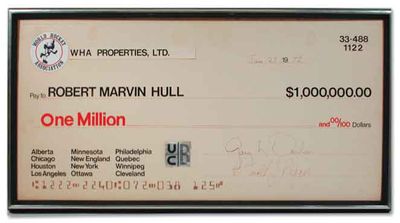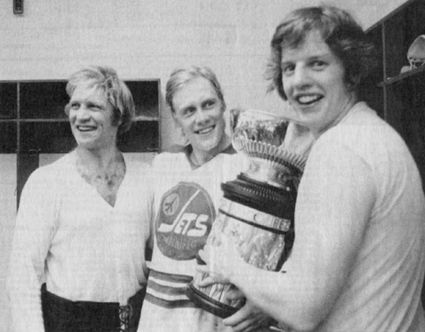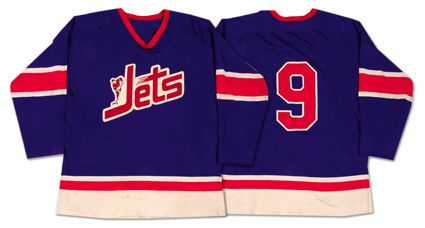
Sunday, June 27, 2010
1972-73 Winnipeg Jets Bobby Hull Jersey
On this date in 1972, the Winnipeg Jets signed Bobby Hull to a $2.5 million ten-year contract, which included a $1 million signing bonus, firing the first major shot in the WHA/NHL war for the control of hockey.

Hull had been a member of the Chicago Black Hawks of the NHL for fifteen seasons when the upstart World Hockey Association came looking for a star player to jump start the league and attempt to buy instant credibility, and found their man in Hull.
Coming off a 50 goal season with Chicago, when Hull jokingly told the WHA he'd jump for a million dollars, the WHA owners and league officials agreed to contribute to the cause and Hull was signed to a ten year, one million dollar contract. The WHA would not last the full ten years.

Once Hull was in the fold, other players soon followed, mainly in search of the higher paychecks offered by the new league, as Gerry Cheevers, Pat Stapleton, Ralph Backstrom, J. C. Tremblay and Rejean Houle also jumped leagues.
Despite an injunction filed by the Black Hawks which kept Hull out of the first 14 games of the 1972-73 season, the damage was done and eventually Hull became a full time Jet and the WHA was off and running.
Hull paid immediate dividends to the league and the Jets, raising the profile of the league and leading the Jets in scoring with 51 goals and 52 assists for 103 points, placing fourth in league scoring as the Jets finished atop the Western Division standings and leading Winnipeg to the Avco Cup Finals. Hull was also named the WHA Most Valuable Player in 1973, but it could be said that he had already earned that distinction by simply signing with the league in the first place!
While not every team and every building in the WHA was first class, the league debuted with teams in Cleveland, Boston, New York, Ottawa, Philadelphia and Quebec City in the east and Edmonton, Chicago, Houston, Los Angeles, Minneapolis/St. Paul and Winnipeg in the west, with the Boston franchise, known as "New England" taking the inaugural championship.
In order to compete, or more accurately try to gain an advantage, the WHA embarked on a policy of signing underage players, as NHL rules prohibited the signing of any player under the age of 20, which the WHA gleefully ignored, allowing it to scoop up players such as Wayne Gretzky, Mark Howe and his brother Marty, Mike Gartner and Mark Messier over the course of it's history.
For the next season, Hull was joined in the league by NHL legend Gordie Howe, who was lured out of retirement in order to play with his sons in Houston with the Aeros. Hull would top his goal output with 53, but the Jets would drop in the standings and get bounced in the playoffs in four straight by Howe and the Aeros.
The franchise shifting began in season two, with the New York Raiders being renamed the "Golden Blades" and then moving out of Madison Square Garden to save money, landing in New Jersey in a rink so bad the ice surface wasn't level as the puck would vanish from the goalies view as it sank into the dips of the waves on the ice surface! Worse, the visiting teams had to change out of their gear only after being bused back to their hotel. Additionally, the Philadelphia market was lost as the Blazers relocated out west to Vancouver, while Ottawa moved into Maple Leaf Gardens in Toronto. The season concluded with the Howe's leading the Aeros to the title.
The league expanded in 1974-75 with new teams being added in questionable markets such as Indianapolis and Phoenix, the New England franchise abandoned Boston for Hartford, the bad joke that was New Jersey moved to San Diego while the former Los Angeles franchise briefly stopped in Detroit before moving to Baltimore mid-season before folding for good. It would be the very first franchise to fold completely in the league, setting the tone for what was to follow, as Chicago was lost for good after the season. At the conclusion of the season, Houston defended their title.
Cincinnati was added to the league, along with Denver, but the Franchise shifting continued in 1975-76, as the brand new Denver club moved to Ottawa mid-season and then quit after 41 games and the Minnesota Fighting Saints called it quits after 59 games. Meanwhile, Vancouver moved inland to Calgary and Winnipeg claimed their first championship.
The league continued to press on in 1976-77, but the hopes of lasting long enough for a merger with the NHL started to become the goal, as the league, which once had teams in New York, Chicago, Los Angeles and Philadelphia, now had teams in Birmingham, Cincinnati, Indianapolis, Phoenix and San Diego.
The unsettled nature of the league continued as Cleveland moved to St. Paul but failed to last the whole season. Toronto moved to the deep south to Birmingham. Quebec won their only championship that season.
San Diego, Calgary and Phoenix failed to answer the bell for the 1977-78 season as the league shrunk down to only eight clubs and the Jets won their second championship.
Long time franchise Houston threw in the towel after the 1977-78 season, leaving the final WHA season with seven clubs, beginning with Indianapolis, who folded after 25 games, leaving just six teams to stagger home to the finish line - Cincinnati and Birmingham plus mainstays Edmonton, New England, Quebec and Winnipeg, who won their second consecutive, and third overall, title.
Following the conclusion of the seventh season of the WHA, a merger agreement was struck, which allowed Edmonton, Quebec, Hartford and Winnipeg to join he NHL as expansion teams, with some rather strict provisions that cost them millions of dollars and many of their players, leaving them at an enormous competitive disadvantage, which some clubs dealt with better than others, primarily the Oilers, who won the Stanley Cup just five seasons later, their first of five in seven seasons.
Despite the history of unstable franchises, the WHA left a legacy of entertaining, wide-open play, higher player salaries and the acceptance of European players.
Today's featured jersey is a 1972-73 Winnipeg Jets Bobby Hull jersey as worn by Hull in the preseason prior to the first ever WHA regular season when they changed to jerseys with the same first year only crest, but with a different striping pattern.
The regular season set of jerseys were notable for their contrasting nameplates, the blue jerseys having white nameplates with red lettering and the white jerseys sporting red nameplates with white letters.
For the second season the Jets adopted their more familiar round logo, which survived the entire lifespan of the WHA and lasted until the 1989-90 NHL season before undergoing a modernization.
photo courtesy of Classic Auctions
Our first video is an interview with Hull on the occasion of the Jets retiring his jersey #9 in 1989.
Our next video features other WHA players giving their scouting reports on Hull followed by Hull's thoughts on joining the league. Notice the white nameplates with red lettering on the Jets first year jerseys.
Labels:
Hull Bobby,
WHA,
Winnipeg Jets
Subscribe to:
Post Comments (Atom)














My childhood bears the scars of that million dollar check.
ReplyDeleteA Chicago native perhaps?
ReplyDeleteYou bet. Hull's signing by the Jets came on the heels of 1971 Stanley Cup Finals loss to the Canadiens. I'm old so I remember a time in sports that wasn't influenced so much by money and contracts. Of course all the player movement in sports has helped me purchase some really reasonable jerseys.
ReplyDelete